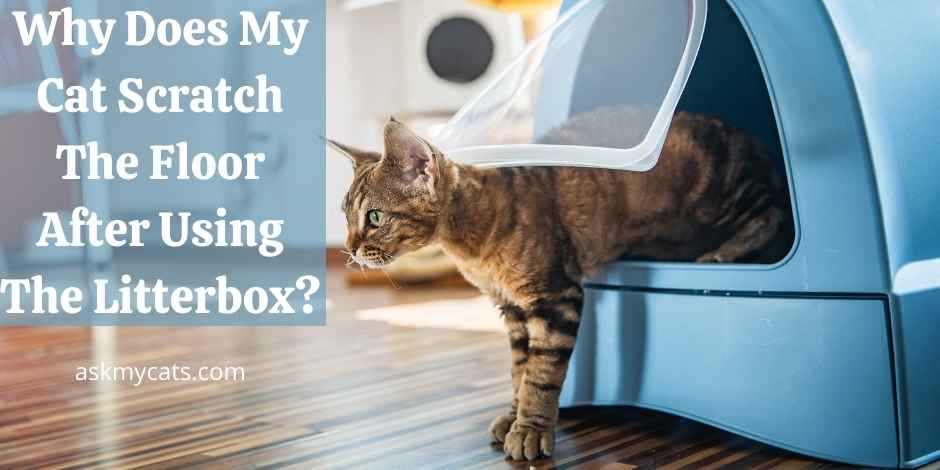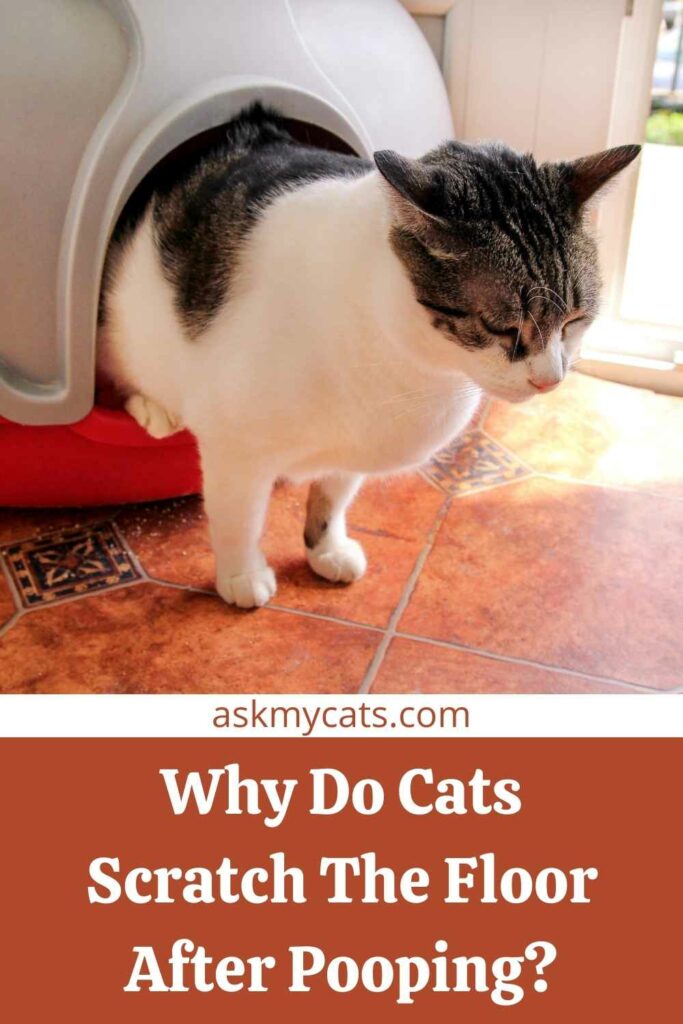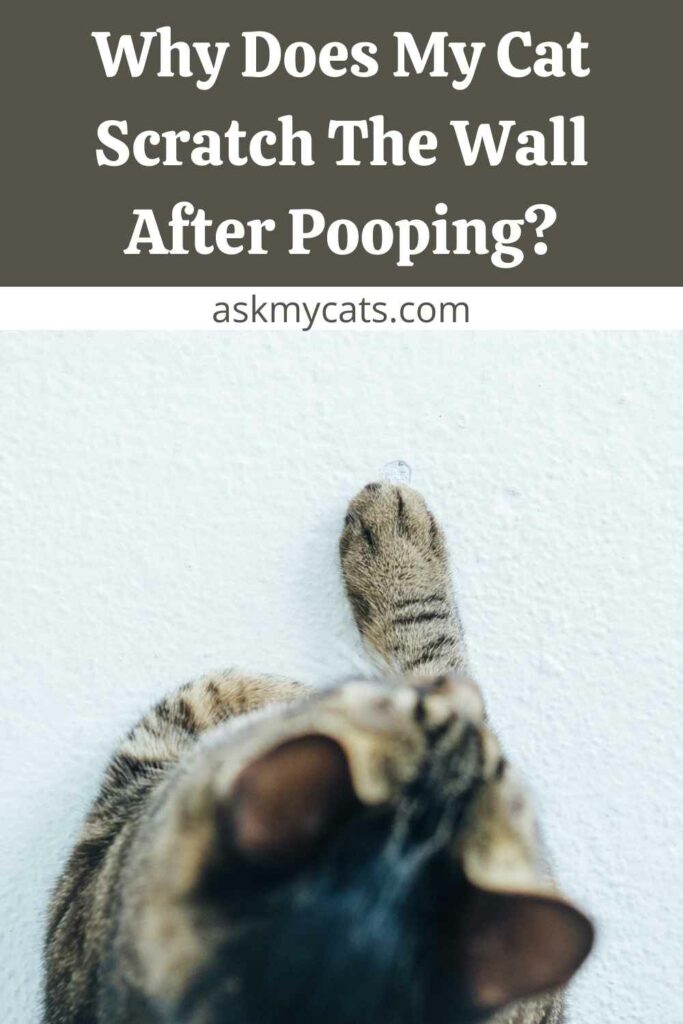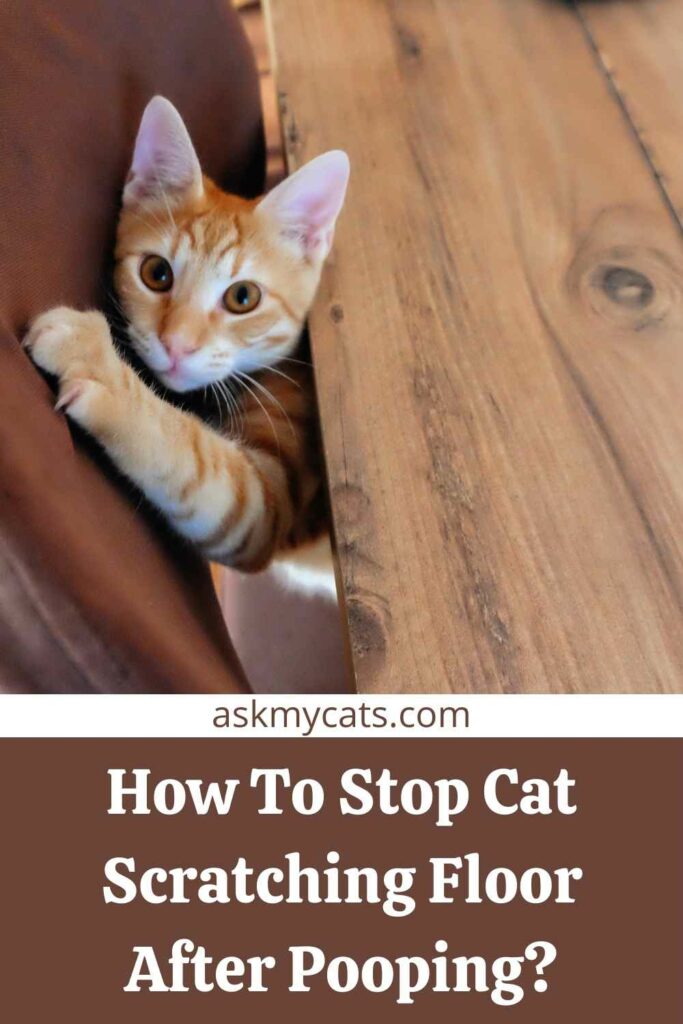Cats sometimes exhibit strange mannerisms, such as clawing the floor after pooping. This is frequently the result of a litter box failing to disguise the aroma of its waste. If this is the case, the stench of your cat’s excrement can be removed by cleaning out the litter box.
Cats who scratch the floor or the wall after using the litter box are typically expressing a remark about the litter box or the litter that is being used. Frequently, the cat box is too small for the cat, there is insufficient litter, or there is too much litter in the cat box.
While these are the most popular solutions, keep in mind that some cats claw surfaces after pooping for a variety of reasons. Cats may scratch floors to clean their nails or merely out of habit, in addition to masking the scent of their excrement.


Give Your Cat the Perfect Day
Get the Free Ebook!
Why Do Cats Scratch The Floor After Pooping?
Cats will go to great lengths to hide the odor of their excrement. Cats scratch the floor after pooping because their litter boxes aren’t always cleaned frequently enough, or they’re the improper size and they try to clean themselves.

Getting a large enough litter box with higher sides is likely to stop any floor-scratching after pooping.
Cats are genetically programmed to hide their excrement or at least the scent of it. Consider the wild forebears of the domestic cat. Wild cats are predators that must remain hidden at all times.
This is a concern with cat waste since cat urine has a strong odor. In the wild, cats will go to any length to conceal their smell since it is a matter of life and death. Wild cats must conceal themselves from both prey and predators in order to feed and avoid being devoured.
Cats often bury their excrement in the earth to disguise their presence. You will have noticed this tendency if your cat takes its business outside. Despite the fact that your house is very different from the forest, your cat retains the instincts inherited from its wild ancestors.
Cat litter is used in place of soil inside. In an ideal world, your cat will bury its excrement in the litter by scratching within the box. This assures that the odor is buried with it.
However, there are a few reasons why they would scratch at the neighboring floor:
The litter box is insufficiently sized: The most prevalent reason for your cat scratching the floor. Your cat has most likely outgrown its box.
Too low tray sides: If the tray edges are too low, excrement and odor may run over the sides.
The box requires cleaning: Cats have a more sensitive sense of smell than humans. If your cat does not use its litter box and instead scratches the floor next to it, the litter tray is likely to have a strong stench.
After pooping, your cat may be cleaning its nails. Most cats are willing to remove dirt and debris from their paws and nails by chewing them.
Cats, on the other hand, file their nails by scratching the floor. This is best accomplished using a scratching post, although it may not be possible. Some cats prefer to clean their nails just after going to the potty.
Some cats scratch out of habit as well. For example, the cat’s mother may have trained it to scratch after pooping. Kittens will imitate their mother’s behaviors, whether or not they are functional.
You will need to break your cat’s habit in order to fix this problem. Distract it with a toy before it scratches to break the behavior.
Cats scratching after pooping aren’t dangerous, but it is an indication that something needs to be done. If you have done everything possible to keep your cat’s litter box clean and roomy, yet your cat still scratches, it might just be a habit. Training will be required to break the habit.
You might also like to read about how do cats clean themselves after pooping
Why Does My Cat Scratch The Wall After Pooping?
Cats sometimes exhibit strange mannerisms, such as scratching the wall after pooping. This is frequently the result of a litter box failing to cover the aroma of its feces. If this is the case, the scent of your cat’s excrement can be removed by cleaning out the litter box.

Your cat may scratch the wall after pooping in order to conceal her feces from other cats or potential adversaries. This stems from a cat’s instincts.
While cats normally hide or bury their messes in the dirt or grass, they are unable to do so inside the home, so they scratch the walls in the hopes of hiding it there.
Cats are also renowned as clean pets, and because they dislike unpleasant scents, it is normal for them to hide or dispose of their waste in order to eliminate unwanted odors.
If your cat is unhappy with the litter or the size of the box, she may scratch the wall after using it. As a result, she scratches to convey her annoyance or frustration.
Most of the time, the behavior is caused by the size of the litter box or the litter itself. The cat will scratch if the litter box is too tiny. Similarly, whether the litter amount is too small or too large, the cat will scratch. It’s an expression of dissatisfaction with its garbage.
Also, find out why does my cat scratch the side of the litter box
Cats have a natural proclivity to bury their waste. That’s why you’ll often notice them scratching on the floor or the grass in search of a suitable location for their stools.
When cats don’t want other cats to take up their odors from their stools, they engage in this activity.
Keep in mind that cats are inherently clean pets. They despise the scent of their excrement, and anytime they pick up dirt, dust, or stinky stuff, you’ll notice them licking the area vigorously to remove the unattractive mark or foul stench.
The same is true for burying their waste. It generally occurs when the cat discovers that its litter box is too tiny. As a result, the cat seeks out another location to bury its feces in order to avoid making a mess.
A cat clawing to hide its poop will usually seek concealed areas, such as your backyard. But, because it can’t get out of the house, the cat will scratch the wall or the floor, trying for a suitable area to hide the mess.
You must be interested to know about how to clean poop off kitten paws
How To Stop Cat Scratching Floor After Pooping?
Let us emphasize right away that the solution you devise to keep your feline friend from scratching objects must address the underlying cause of the problem.
As a result, you should first figure out what is causing your little furry friend to scratch on floors and other objects.
The following are some pointers to help you refocus your damaging scratching behaviors.

1. Trim Their Nails
Regularly trimming your cat’s nails can considerably minimize the propensity to scratch on floors. If a cat’s nails are sharp and overgrown, it will instinctively desire to claw at things. It’s the same as cattle and most herbivores head-butting and horn-locking.
Trimming your cat’s nails, on the other hand, is no easy task. This is due to the fact that the nails are extremely delicate, and even a little paw can inflict major cuts on your palm.
First, you must gain the cat’s confidence so that he can lie motionless while you perform the activity. Also, find a moment when the cat is most comfortable and cut the nails softly with clippers developed exclusively for cat claws.
If you have fearful cats, you should consider towel-wrapping them to restrict them and prevent excessive pawing.
2. Grab A Scratching Post
Cats will not scratch just anything; they are quite picky about the surfaces they scratch. Perhaps the cat finds the object’s position handy. For example, an object in a cat’s playground will definitely be scratched.
So, even if you remove these items and replace them with scratching posts, make sure the posts are placed in the same location as the preceding object.
Because of the texture, height, form, and fragrance of certain things, a cat may enjoy scratching on them.
In general, attempt to notice all of the physical characteristics of the preferred thing. Then, try replacing it with a comparable but different scratching post.
If you have many cats, have as many scratching posts as possible and space them evenly. This will assist to avoid confrontations.
It might be tough to replace a favorite object with a new scratching post at times. There’s no need to be concerned because there are several solutions available to you here.
3. Punishment
When the occasion demands it, you can administer some punishment, although in a subtle and indirect manner. For example, as the cat approaches the improper object, use a whistle to divert it just before it begins to scratch on it.
Short, sharp sounds are generally unsettling to cats. As a result, they may come to identify the sounds with floor scratching and finally quit doing so.
Other diversions include rattling a Coke can filled with stones, using a water-filled squirt bottle, or placing a motion detector near the object that will sound an alert anytime the cat approaches it.
4. Pheromone therapy
Since cats frequently scratch surfaces in reaction to pheromones left behind by other cats, pheromone treatment can be used to lessen stressful and unwanted scratching behavior.
Synthetic variations of the cat’s natural pheromones are used in pheromone therapy to make your cat feel safer during stressful conditions.
You merely need to sprinkle some loose catnip on the areas that the cat scrapes to attract the cat to those surfaces. Once the cat arrives and takes up “its odors,” it will stop clawing the poles.
You might like to know why do cats run after they poop
Frequently Asked Questions
Why does my cat sweep the floor after using the litter box?
Cats scratching the floor or the wall after using the litter box are typically expressing a statement about the litter box or the litter that is being used. If the litter box isn’t clean enough, cats may indulge in this habit.
Why is my cat scratching the floor near her food before eating?
In and of itself, pawing or scratching around the meal is not dangerous. It’s part of your cat’s nature to be secure and mask her existence from other predators. In fact, some cat owners find such behavior to be endearing. So, if this is your situation, feel free to let your cat alone and allow her to scratch.
Do cats clean themselves after pooping?
Cats seldom lick the bum region after urinating; however, if the feces are sticky or runny, the cat may feel compelled to clean up a bit, particularly if litter becomes trapped around the anus. Normally, licking does not follow normal, firm bowel movements.
Final Words
A cat is always clawing the floor, especially when it comes to a little box. This is sometimes just a terrible habit that affects not just kittens, but even adult and senior cats. And, on occasion, it specifies medical difficulties as well as the agony the cat must endure.
Leave your questions in the comments section below.
Also, check out why does my cat scratch the wall
